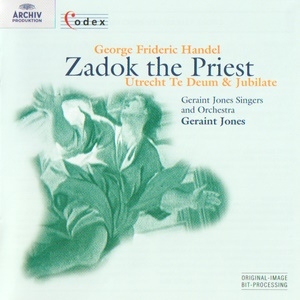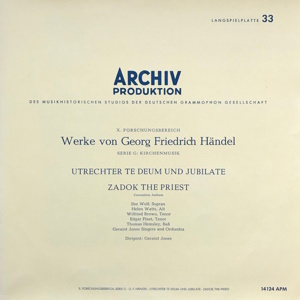 |
|
1 CD -
453 167-2 - (p) 1996
|
|
50
Jahre (1947-1997) - Codex I Serie - 6/10
|
|
|
|
|
|
|
|
George
Fridderic HANDEL (1685-1759)
|
"Utrecht"
Te Deum & Jubilate (HWV
278 & 279)
|
|
|
|
|
-
"We praise thee, O God" - (Chorus)
|
|
4' 30" |
1 |
|
-
"To thee all Angels cry aloud" - (Soli
& Chorus) - "To thee
Cherubin and Seraphin" - (Soli
& Chorus)
|
|
2' 45" |
2 |
|
-
"The glorious company of the
Apostles" - (Soli & Chorus)
- "Thou art the King of Glory" - (Chorus)
|
|
5' 11" |
3 |
|
-
"When thou took'st / When thou hadst
overcome" - (Soli & Chorus)
- "Thou sittest at the night hand of
God" - (Chorus)
|
|
3' 58" |
4 |
|
-
"We believe that thou shalt come" -
(Soli & Chorus)
|
|
3' 09" |
5 |
|
-
"Day by day" - (Chorus) /
"And we worship thy Name" - (Chorus)
|
|
2' 26" |
6 |
|
-
"Vouchsafe, O Lord" - (Soli
& Chorus)
|
|
3' 23" |
7 |
|
-
"O Lord, in thee have I trusted" - (Chorus)
|
|
1' 20" |
8 |
|
(Jubilate) |
|
|
|
|
-
"O be joyful in the Lord" - (Solo
& Chorus)
|
|
2' 10" |
9 |
|
-
"Serve the Lord with gladness" - (Chorus)
|
|
2' 13" |
10 |
|
-
"Be ye sure that the Lord he is God"
- (Duo)
|
|
2' 34" |
11 |
|
-
"O go your way into his gates" - (Chorus)
|
|
2' 49" |
12 |
|
-
"For the Lord is gracious" - (Trio)
|
|
3' 29" |
13 |
|
-
"Glory to be the Father" - (Chorus)
|
|
5' 42" |
14 |
|
Zadok
the Priest (Coronation Anthem
No. 1, HWV 258)
|
|
|
|
|
-
"Zadok the Priest"
|
|
2' 12" |
15 |
|
-
"And all the people rejoic'd"
|
|
0' 51" |
16 |
|
-
"God save the King"
|
|
3' 02" |
17 |
|
|
|
|
Ilse Wolf, soprano
Helen Watts, contralto
Wilfried Brown, Egar Fleet,
tenor I / II
Thomas Hemsley, bass
GERAINT JONES SINGERS AND
ORCHESTRA
- Winifred Robert, violin
- Harold Jackson, Bernard Brown, trumpet
- Geoffrey Gilbert, flute
- Edward Selwyn, Michael Dobson, oboe
- Ronald Waller, Anthony Judd, bassoon
- Ambrose Guntlett, violoncello
- Edward Merrett, double bass
- Alan Harverson, organ
Geraint JONES
|
Instruments:
- Violin: J. B. Guadagnini, 18th
Century
- Trumpets in D: Besson & Co.
London 1) 1950, 2) 1954
- German Flute: Verne Powell, Boston,
USA, 1957
- Oboes: 1) Louis, London, 1935, 2)
Howarth, T. W., London, 1947
- Bassoons: Heckel, Biebrich, 1) 1951,
2) 1939
- Violoncello: Matteo Goffriller,
Venice, 1729
- Double Bass: Gaspar da Salo at
Brescia, c. 1560/70
- Positive Organ: Abraham adcock and
John Pether, c. 1750
Publishers: Ausgabe der deutschen
Händelgesellschaft, Leipzig 1869 (ed.
F. Chrysander)
|
|
|
|
|
Luogo
e data di registrazione |
|
Walthamstow
Town, London (Inghilterra) - 30
giugno / 2 luglio 1958
|
|
|
Original
Editions |
|
-
Archiv Produktion | 14 124 APM | 1
LP | (p) 1949 | ANA
|
|
|
Edizione
"Codex"
|
|
Archiv
Produktion "Codex" | 453 167-2 |
durata 51' 58" | LC 0113 | 1 CD |
(p) 1996 | ADD | mono
|
|
|
Executive
Producer |
|
Dr.
Hans Hickmann
|
|
|
Recording
Producer |
|
Dr.
Ursula von Rauchhaupt
|
|
|
Balance
Engineer (Tonmeister) |
|
Harald
Baudis
|
|
|
Cover |
|
Fresco
bz andrea Poyyo, St. Ignayio, Rome
(detail) - © Mauro Pucciarelli,
Rome
|
|
|
Art Direction
|
|
Fred
Münzmaier
|
|
|
Note |
|
Original-Image-Bit-Processing
- Added presence and brilliance,
greater spatial definition |
|
|
|
|
|
ORIGINAL
EDITIONS

1 LP - 14 124 APM - (p) 1959
|
Treasures
from Archiv Produktion’s
Catalogue
A rare and valuable collection of
documents is the pride of any
library or archive. CODEX, Archiv
Produktion’s new series, presents
rare documents in sound from 50
years of pioneering recording.
These recordings have been
digitally remastered using
original-image bit-processing
technology and can now be
appreciated in all the richness of
their original sound-image. They
range from the serene counterpoint
of a Machaut, the intensely
spiritual polyphony of a Victoria,
to the imposing state-music of a
Handel.
For the artists on Archiv
Produktion recordings, a constant
aim has been to rediscover the
musical pulse of past times and to
recreate the spirit of past ages.
In this sense each performance
here - whether by Pro Musica
Antiqua of Brussels in the 1950s,
the Regensburg Domchor in the
1960s, or Kenneth Gilbert and
Trevor Pinnock in the 1970s - made
a vital contribution to the
revival of Early Music in our
time.
CODEX highlights recordings that
were unique in their day, many of
them first recordings ever of this
rare and remarkable repertoire,
now appearing for the first time on
CD. A special aspect of the
history of performance in our
century can now be revisited, as
great moments from Archiv
Produktion’s recording history are
restored and experienced afresh.
Dr.
Peter Czornyi
Director,
Archiv Produktion
HANDEL: "UTRECHT" TE DEUM AND
JUBILATE - ZADOK THE PRIEST
Handel arrived in London in 1710
and pursued a virtually continuous
career there for the rest ofhis
life. Most of his music was
written for the theatre, but he
also composed English church music
to enhance services marking
particular national events. He
became the composer of music for
principal court or national
celebrations, though we have no
reason to doubt that his church
music also expressed religious
sentiments that came naturally to
the composer. He also seems to
have revelled in the grand effects
that could be achieved from the
large (in 18th-century terms)
forces that were gathered for
state occasions in London. In this
respect, the works included on
this recording marked a new
development in English church
music: in them, traditional
English texts for national
religious celebrations received
forceful setting in the version of
the late Baroque musical style
that Handel made especially his
own. This style is apparent in the
Latin psalms that Handel had
composed in Rome in 1707, and
indeed probably had its roots even
earlier in German works that are
now lost: but it was in London,
and in the English language, that
he found the opportunities to
bring the style to its most
developed and vivid form.
The Peace of Utrecht, ending the
European War of the Spanish
Succession, fell at an interesting
period in Handel’s career. From
the English perspective, active
engagement during the first decade
of the 18th century - the period
of the Duke of Marlborough’s
famous victories - had given place
to a political change that
involved withdrawal from the war.
This change of policy from Queen
Anne’s government was looked upon
with disfavour by her allies in
the war, including the Hanoverian
interest. Handel’s ready
participation in the celebrations
of the Peace in 1713 indicated his
commitment to his new-found home
in London, and probably explains
the various anecdotes about the
initial coolness with which the
composer was regarded by the
Elector of Hanover when he came to
succeed as King George I of Great
Britain upon Anne’s death the next
year. Handel composed the
“Utrecht” music early in 1713: his
only previous piece of English
church music had been a short
“verse” anthem for the Chapel
Royal composed towards the end of
1712. He may well have looked at
the published score of Purcell’s D
major Te Deum and Jubilate from
1694, to give him a general idea
of the sort of setting that the
texts might receive in a full
ceremonial layout for soloists,
chorus and orchestra. But Handel’s
version is on a much bigger scale
than Purcell’s, and in a much more
powerful style: it is also a
remarkable achievement for a
composer whose contact with the
English language was still
relatively recent. The state
service in celebration of the
Peace, which eventually took place
in July 1713 at St. Paul’s
Cathedral, was preceded by a
number of public rehearsals, at
which the music appears to have
been well received: one newspaper
report said that it was “much
commended by all that have heard
the same, and are competent judges
therein”. It seems certain that
the “competent judges” had heard
nothing quite like it before: with
the “Utrecht” music Handel set up
a new model for ceremonial English
church music.
The coronation service for King
George II and Queen Caroline in
October 1727 provided the next
occasion on which Handel could
exercise this grand style:
according to one report, he had 40
voices and 160 instruments at his
disposal. It seems that Handel’s
musical contribution to the
coronation service was the result
of a specific invitation or command
from the Royal Family: the leading
Chapel Royal composer, William
Croft, had died a couple of months
before the coronation, and the
King seems to have used his
influence in Handel’s favour, in
preference to the leading London
church musician Maurice Greene,
who eventually filled Croft’s
place at the Chapel Royal. Handel
had not written any music for the
previous coronation, of King
George I in 1714. At that date he
was still a German, though
receiving a British pension
granted by Queen Anne, possibly
largely as a reward after the
“Utrecht” music. By the time of
the coronation in 1727, however,
his situation was different: in
1723 he had received a (largely
honorary) court appointment as
Composer for the Chapel Royal, and
one of King George I’s last acts
in 1727 had been to sign a
parliamentary bill naturalizing
Handel as a British citizen.
According to an anecdote later
recorded by Charles Burney, Handel
was sent the texts of the anthems
for the coronation in 1727 by the
Bishops and responded, “I have
read my bible very well, and shall
choose for myself.” In fact the
coronation liturgy was traditional
even to the texts of the anthems,
and the form of service used in
1727 was very similar to that used
in previous coronations: the words
that Handel set varied only in
minor details from ones that
composers had set in the past. The
scale and style of Handel’s music
in 1727 was entirely new, however,
and nowhere more so than in Zadok
the Priest, the anthem that
traditionally accompanied the
anointing of the King. The
cumulative effect of the
curtainraising orchestral
introduction, the dramatic entry
of the full choir divided in seven
parts, and the concentration of
the subsequent blocks ofmusical
sound for “God save the King”,
must have been thrilling for its
original listeners. It is not
surprising that this anthem has
become a “classic”, used at every
subsequent British coronation.
Handel himself contributed to the
establishment of the anthem’s
popularity by including part of it
in the score of his first theatre
performances of English oratorio
five years after the coronation:
he would probably have been
neither surprised nor displeased
that this has become one ofhis
best-known works.
Donald
Burrow
|
|
|
|